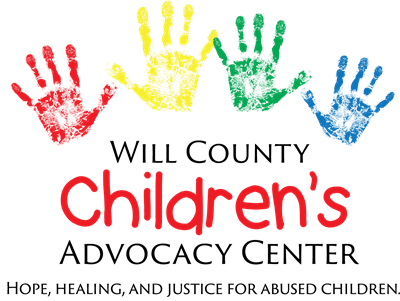
#ItsYourBusiness
Child abuse thrives when good people decide it’s none of their business.
During the pandemic, many kids are trapped where they’re most likely to suffer abuse, and kept away from the caring professionals who usually spot and report it. #ItsYourBusiness Do something.
YOU may be the only one who will!

We continue to see essential cases for FORENSIC INTERVIEWS, and our evidence-based TRAUMA-FOCUSED THERAPY and FAMILY ADVOCACY services are being provided through telehealth solutions. Read Will County Children's Advocacy Center's plan to minimize the exposure of employees, MDT partners, and the children and families we serve, by clicking on the red button.
In times of economic insecurity and crisis, rates of child abuse and neglect increase. However, reports to the Department of Children and Family Services’ abuse and neglect hotline have dropped dramatically during the spread of the COVID-19 pandemic.
When children stay at home, they are isolated from places where adults often look out for their safety and well-being including schools, child care facilities, places of worship and other public areas.
We need ALL adults to step up: family members, neighbors, essential workers serving families in grocery stores, gas stations, restaurants, pharmacies, etc., mail and delivery workers, and school professionals who are still working with children virtually -- ALL NEED TO BE AWARE of their responsibility to protect children.
You are essential to child safety during this time. Below you will find information on how to recognize that a child is unsafe and respond. These resources are designed for essential workers serving on the ground to keep our communities running during the COVID-19 crisis, school professionals during this time of virtual learning, and the general public.
Raise awareness. Awareness and advocacy are critical to child abuse prevention and intervention. Share this page of resources on social media.
Resources for Caregivers & All Adults Who Care About Children
- *NEW CAREGIVER GUIDES* Includes bilingual resources for families (Yale Child Study Center and NCTSN)
- Parent/Caregiver Guide to Helping Families Cope With the Coronavirus Disease 2019 (National Traumatic Stress Network)
Caregivers and children may have worries about catching COVID-19. See these helpful multilingual resources from the National Child Traumatic Stress Network for your clients and families. English, Spanish, and Chinese guides are available.
[ENGLISH] Parent/Caregiver Guide to Helping Families Cope With the Coronavirus Disease 2019
- Strengthening Protective Factors to Protect Children from Abuse
This resource explores how protective factors can buffer children from harm and increase the chances they adapt positively to adversities such as the COVID-19 pandemic. Families and communities can work together to promote these protective factors. - How to Be a Safe Adult
Cultivating a healthy, trusting relationship with kids is actually one of the best protections against abuse. Children will be less vulnerable to people who would violate their boundaries and more likely to tell you if they are uncomfortable or if abuse occurs. This resource from Darkness to Light offers practical tools and strategies to establish strong relationships to become the “safe adult” in the lives of children you care about. - Minimizing Opportunities During Coronavirus Quarantine
Minimizing opportunities for one on one interaction with a potential abuser is challenging with the current stay at home orders. For children who live with their abusers, this resource provides concrete steps adults can take to create safer home environment.
For Children
- NPR’s Kid’s Comic Exploring the Coronavirus
Directions to fold the printed document into a magazine for children here.
In general, COVID-19 creates flu-like symptoms, which include cough, fever, and shortness of breath. It spreads by close contact with those who are ill (generally from sneezing or coughing), and symptoms may appear 2-14 days post-exposure. There is no vaccine yet for COVID-19.
Some groups are particularly at risk for COVID-19:
- Those 60 and older.
- Individuals with underlying health conditions such as heart issues, lung issues (asthma, COPD, etc.), and diabetes.
- Those who are immune-suppressed (including those who are taking medication which lower’s one’s immune system).
Special care should be taken with these populations whether or not the general community risk is high because the consequences can be very serious if such a person contracts the illness. More information can be found on the World Health Organization’s website.
General Prevention Measures
- Wash hands with soap or sanitizer for 20 seconds (moisturize your hands after washing them to prevent cracks in skin which can admit the virus—but do not use a communal lotion bottle, as it can become colonized with bacteria and viruses).
- Don’t touch your eyes, nose, or mouth with unwashed hands.
- Avoid contact with sick people.
- Sanitize and clean surfaces at home and at work frequently.
- If you cough or sneeze do so in your elbow or in a tissue and immediately throw the tissue away. Wash your hands immediately after coughing or sneezing.
- If you are ill, stay home.
CDC Guidance For Law Enforcement Personnel
The Centers for Disease Control have offered a tip sheet for law enforcement personnel on safely performing their duties during the epidemic.
Child Welfare Considerations During COVID-19
This article from the Chronicle for Social Change considers many perspectives and includes input from different stakeholders in child welfare, including children themselves.
Guidance For Child Welfare Agencies
A message from Dr. Jerry Milner, Associate Commissioner of Children's Bureau, outlines guidance around caseworker visits, site reviews, program improvement plans, investigations, and other legislative and regulatory issues in this situation.



